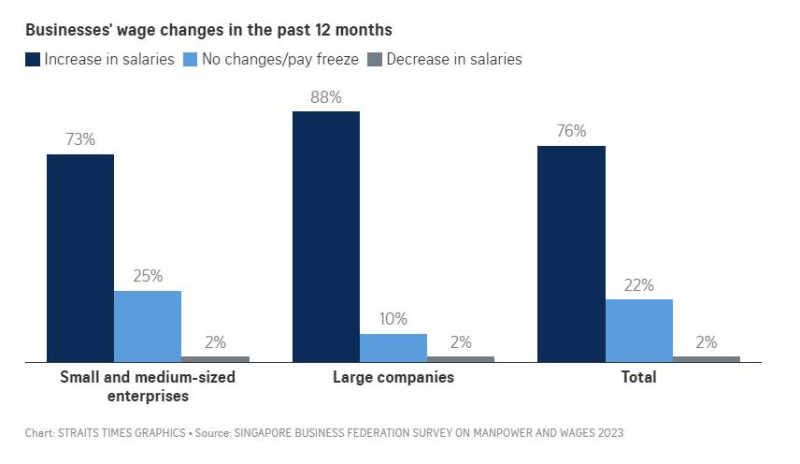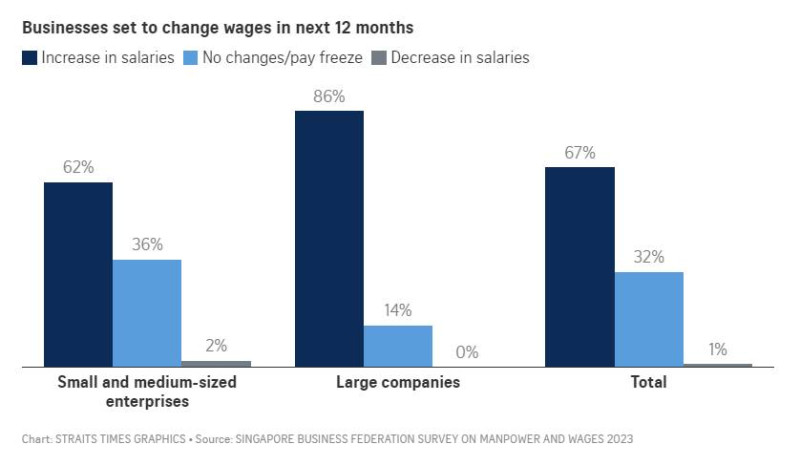2 in 3 employers in Singapore plan to raise salaries in the year ahead, survey shows
SINGAPORE — The majority of employers here look set to offer staff pay raises in the year ahead despite a lack of optimism about economic prospects, based on the results of a business survey out on Tuesday (Sept 12).
A total of 67 per cent of respondents polled in July reported that they plan to increase wages over the next 12 months, with an average raise of six per cent.
However, prospects appear to have dimmed compared with the previous year. More respondents — 76 per cent — said that they had already raised wages in the past 12 months.
Another 32 per cent of firms said they plan to freeze pay in the next 12 months, while just one per cent are looking to implement pay cuts.
Breaking down the salary changes by company size, 88 per cent of large companies increased salaries in the last 12 months, and 86 per cent of them expect to increase salaries in the next 12 months.
Among small and medium enterprises (SMEs) surveyed, 73 per cent raised wages in the last 12 months, and 62 per cent expect to do the same in the next 12 months.
On the whole, 61 per cent of respondents had both increased salaries in the last 12 months and also will continue to increase salaries for the next 12 months.
These are some of the findings of the Singapore Business Federation's (SBF) Survey on Manpower and Wages, which was conducted from July 20 to July 31 this year. It surveyed 282 businesses, comprising SMEs as well as large companies across all major industries.
Associate Professor Walter Theseira, an economist at the Singapore University of Social Sciences, said that recent wage changes, while high in nominal terms, have only just stayed ahead of inflation.
"For example, although last year's wage increase was 6.5 per cent as measured by the Ministry of Manpower, which is close to what was reported by firms in the (SBF) survey, real wages only increased by 0.4 per cent due to high inflation."
[[nid:636136]]
"So, the projected wage growth does seem to be ahead of inflation - which is moderating — but it may in a sense just be catching up, given that real wages hardly increased last year," added Prof Theseira.
The survey results also reflect a positive employment outlook, with 89 per cent of employers expecting no change or an increase in their number of full-time employees in the next 12 months. This is more than the 80 per cent who did not change or hired more full-time employees in the previous 12 months.
The expected salary increases and hiring come despite companies bracing themselves for weaker economic conditions and higher costs in the coming year, as well as lower revenue.

According to the survey, Singapore firms expect increased business costs to be a top concern.
Of the respondents, 85 per cent said that they expect costs to go up. The most common expectation among SMEs — selected by 42 per cent of them — was an increase of between 10 per cent and 25 per cent, while 45 per cent of large companies expected costs to rise by up to 10 per cent.
While 28 per cent of companies think that the economic climate is set to improve in the coming year, more businesses, 35 per cent, expect it to worsen.
Inflation is a significant concern, with 61 per cent of companies polled indicating that inflationary pressure leading to increased business costs is the top global factor impacting businesses.
Mr Kok Ping Soon, chief executive officer of SBF, noted that firms have a positive employment outlook even though business conditions have weakened.
"Nonetheless, there are sectors that expect to do well just as there are sectors that will continue to face headwinds. Hence, differentiated and sustainable wage growth that keeps with the underlying productivity growth of the sectors is important," he said.

Viewing the survey as a whole, Prof Theseira explained that maintaining wages at a competitive level is important for companies regardless of their business outlook: "The main driver of wage increases really is the need to keep staff, given the tight labour market and the inflationary environment that effectively results in real wage reductions if wages remain stagnant.
"You see that all sectors generally plan to have wage increases, including sectors with somewhat pessimistic outlooks for revenue or the economy. I think this is a recognition that without the wage hikes, the firms don't see that it will be possible to retain their existing staff or recruit more."
ALSO READ: $10k starting pay? Netizens express disbelief at NUS undergrads' salary expectations
This article was first published in The Straits Times. Permission required for reproduction.
Disclaimer: The copyright of this article belongs to the original author. Reposting this article is solely for the purpose of information dissemination and does not constitute any investment advice. If there is any infringement, please contact us immediately. We will make corrections or deletions as necessary. Thank you.







